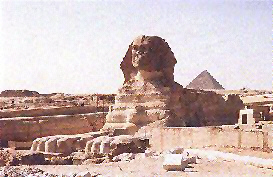Before the Flood
Discussion
Group
Introduction
![]()
Join the
Before the Flood
discussion group

Mr. Ferguson is
Principal Researcher
for the American
Polymathic Institute's
Paleosociology Project.
The Paleosociology
Project is sponsored by
The American
Polymathic Institute.
Our discussion group
is sponsored jointly by
API and Polymathica.

Is There an Ancient Lost Civilization
Just Waiting to be Found?

Built in 7000 BC.? By whom?
Pharaonic Egypt and Sumeria were the first civilizations. Right? Well that's the standard doctrine. However, the Egyptians thought there was a civilization before them. The Sumerians thought there was a civilization before them. It's the modern Archeologists who think that those were just myths. Maybe they're right. But, then again, maybe they aren't.
Egyptologists believe that the Pharaoh Khafre built the Sphinx in 2500 BC. Based upon analysis of the rock from which it is made, many Geologists led by Dr. Robert Schoch, believe it was built around 7000 - 5000 BC., perhaps even earlier. The Egyptologists tell us that the Egyptians of that time didn't have the technology or the manpower to build it. They are right. So who built it? Or are the Geologists mistaken?
In The Message of the Sphinx, Graham Hancock and Robert Bauval provide tantalizing evidence from archeo-astronomy that the construction of the Sphinx can be dated to around 10500 BC. While not in precise agreement with the Geological evidence, it is not contradicted by it either.
A scientifically rigorous case is beginning to coalesce for a pre-Sumerian/Egyptian civilization. What we need is more evidence. Not just about the Sphinx but about what was happening in the period between 10,000 and 20,000 years ago.
Now the American Polymathic Institute's Paleosociology Project weighs in with interdisciplinary evidence that something very interesting may have been happening during this time frame.
Consider the Following:
Anatomically modern humans have been around for perhaps 150,000 years. Apparently they didn't invent agriculture until the beginning of the Holocene (~9000 BC.), when it was invented in three different parts of the world within about a 2,000 year time period.
So the question is, what is the probability that these three inventions of agriculture are causally unrelated events? A rough calculation is as follows. The 150,000 years can be divided into 75 - 2,000 year periods. The first invention is independent, and the second two are dependent. So the answer is 75 X 75 or 5,625:1 AGAINST!
Of course, this assumes that every 2,000 year period contained the same number of human communities with the opportunity to invent agriculture. This is obviously an incorrect assumption. The population was growing more or less constantly. However, even with the most liberal assumptions, the odds cannot be reduced to much less than 30:1 against.
So we are faced with an interesting question. If the inventions of agriculture, more or less simultaneously, in the Middle East, Southern China and MesoAmerica were causally related, how were they causally related? There simply is no easy answer for it.
The Paleosociology Project has developed a mechanism to explain the causal relationship. Based upon the restrictions of Population Genetics, the mechanism is compatible with the hypothesis that one or two civilizations existed in the time period immediately prior to the great glacial melt of 12500 BC. Simply put, the hypothesis is that the human genome changed around that time. This change was an adaptation to a different kind of environment... a civilized environment.
We may be on the verge of a major paradigm shift in Archeology and Anthropology. The evidence is inferential, but it is scientific. We want to emphasize this... this is a scientific, not pseudoscientific discussion group.
Join the Before the Flood Discussion Group. Participate or just listen in. It's easy, it's fast, and it's free.
© 2001 American Polymathic Institute. All rights reserved.